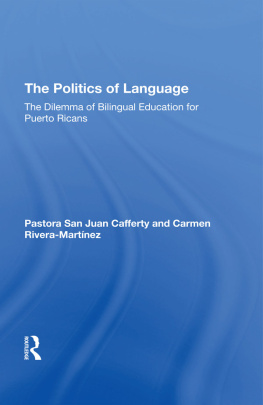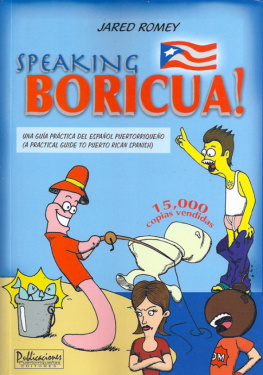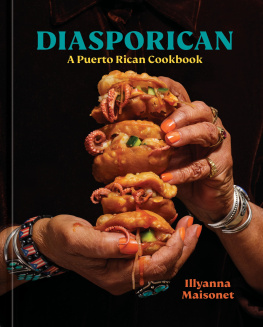The Politics of Language
The Dilemma of Bilingual Education for Puerto Ricans
Westview Replica Editions
This book is a Westview Replica Edition. The concept of Replica Editions is a response to the crisis in academic and informational publishing. Library budgets for books have been severely curtailed; economic pressures on the university presses and the few private publishing companies primarily interested in scholarly manuscripts have severely limited the capacity of the industry to properly serve the academic and research communities. Many manuscripts dealing with important subjects, often representing the highest level of scholarship, are today not economically viable publishing projects. Or, if they are accepted for publication, they are often subject to lead times ranging from one to three years. Scholars are understandably frustrated when they realize that their first-class research cannot be published within a reasonable time frame, if at all.
Westview Replica Editions are our practical solution to the problem. The concept is simple. We accept a manuscript in camera-ready form and move it immediately into the production process. The responsibility for textual and copy editing lies with the author or sponsoring organization. If necessary we will advise the author on proper preparation of footnotes and bibliography. We prefer that the manuscript be typed according to our specifications, though it may be acceptable as typed for a dissertation or prepared in some other clearly organized and readable way. The end result is a book produced by lithography and bound in hard covers. Initial edition sizes range from 400 to 800 copies, and a number of recent Replicas are already in second printings. We include among Westview Replica Editions only works of outstanding scholarly quality or of great informational value, and we will continue to exercise our usual editorial standards and quality control.
The Politics of language: The Dilemma of Bilingual Education for Puerto Ricans
Pastora San Juan Cafferty and Carmen Rivera-Martnez
Demographers predict that by the end of the century Spanish-speaking persons will constitute the largest minority group in the United States--in this context, bilingual education must be considered a crucial issue for educators and policymakers at the state, national, and local levels.
Professors Cafferty and Rivera-Martnez analyze bilingual education policies and programs, particularly as they affect the Puerto Rican child, and reach some startling conclusions. They find that these programs do not, despite the best intentions, offer the equal opportunity and social mobility that has been their purpose.
While the authors attempt to neither examine nor define the general problem of bilingual education methodology, they do address the problem of educating the Puerto Rican child as one minority among many. They suggest alternatives for solving the problem and recommend specific policies for federal, state, and local governments attempting to integrate Spanish-speaking minorities into the educational process.
Pastora San Juan Cafferty, who emigrated from Cuba as a child, is associate professor in the School of Social Service Administration at the University of Chicago and a study director at the National Opinion Research Center. Carmen Rivera-Martnez, a native of Puerto Rico, teaches at the Jane Addams College of Social Work at the University of Illinois Chicago Circle campus.
First published 1981 by Westview Press
Published 2019 by Routledge
52 Vanderbilt Avenue, New York, NY 10017
2 Park Square, Milton Park, Abingdon, Oxon OX14 4RN
Routledge is an imprint of the Taylor & Francis Group, an informa business
Copyright 1981 Taylor & Francis
All rights reserved. No part of this book may be reprinted or reproduced or utilised in any form or by any electronic, mechanical, or other means, now known or hereafter invented, including photocopying and recording, or in any information storage or retrieval system, without permission in writing from the publishers.
Notice:
Product or corporate names may be trademarks or registered trademarks, and are used only for identification and explanation without intent to infringe
Library of Congress Cataloging in Publication Data
Cafferty, Pastora San Juan.
The politics of language.
(A Westview replica edition)
Includes bibliographic references.
1. Education, Bilingual--United States. 2. Education, Bilingual--Puerto
Rico. 3. Puerto Rican children--Education--United States. 4. Puerto Ricans-
United States--Case studies. I. Rivera-Martinez, Carmen. II. Title.
III. Series: Westview replica edition.
LC 3746.C33 371.97687295073 81-7587
AACR2
ISBN 13: 978-0-367-29514-1 (hbk)
The Puerto Rican immigrant to mainland United States is a peculiar sort of immigrant. He is already an American citizen, so he is not a national immigrant. It is linguistically that he is an immigrant, for what separates him most from the rest of the United States is not the small stretch of water that is the Caribbean, but language. He speaks Spanish, and he comes to a monolingual English culture. Thus, he is much like a farmer from the interior of French Canadian Quebec who migrates to British Columbia and finds himself in the same country but in a new linguistic culture.
But it is not merely this which distinguishes the Puerto Rican immigrant. For the typical Puerto Rican is a cyclical immigrant. Traveling solely within his own country--for example, between San Juan and New York--he moves back and forth between two linguistic cultures. And what of his children, as they move back and forth between a Spanish environment and an English one? How are they to learn, and through what linguistic medium?
It is this cyclical migration within his own country which makes the problem of the Puerto Rican immigrant distinctive. A Puerto Rican child caught up in this movement cannot learn only Spanish nor only English, whatever his first language and whatever the dominant language in his school. He must learn both, he must become more able than most of us, because he must survive in two monolingual cultures: Puerto Rico and mainland United States.
What does this imply for such a childs education? What should its goals be, and what methods should be used to achieve those goals? There can be ideologically inspired debate about the question of goals, and such debate has been characteristic of discussions surrounding the education of children of Hispanic backgrounds in the u.s. But when the question is posed in the context of the specific situation of Puerto Ricans, the task becomes a much simpler one. For now, in this circumstance, we know the kind of future life the child must be prepared for, that is, a life in two different monolingual societies with different cultural histories. Thus, arguments about goals need not extend to arguments about what kind of life should be shaped for the child. The childs future life will place him recurrently in two linguistic environments, and he must be prepared for both.
Both focusing their attention in the cyclical migration of the Puerto Rican immigrant to the mainland, Cafferty and Rivera-Martinez make a strong case for programs of education for Puerto Rican children which make them fully literate and capable of functioning in two linguistic domains. This serves as an extraordinarily useful model for all discourse surrounding bilingual programs. For different immigrants are in different circumstances, and it is the particular immigrants likely future which should determine the goals of his education.





